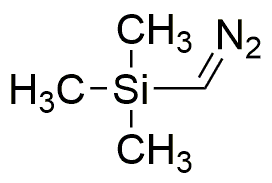Trimethylsilyldiazomethane is widely utilized in research focused on:
- Synthetic Organic Chemistry: This compound is a valuable reagent for the synthesis of various organic compounds, particularly in the formation of carbon-carbon bonds. Its ability to introduce a diazo group makes it useful for creating complex molecular structures.
- Analytical Chemistry: It serves as a derivatizing agent in gas chromatography, enhancing the detection and analysis of certain compounds. This application is particularly beneficial in environmental and pharmaceutical analysis.
- Pharmaceutical Development: Trimethylsilyldiazomethane is used in the modification of drug molecules, allowing researchers to explore new therapeutic compounds with improved efficacy and reduced side effects.
- Material Science: The compound plays a role in the development of novel materials, including polymers and coatings, where its reactivity can be harnessed to improve material properties.
- Biochemistry: It is applied in the modification of biomolecules, aiding in the study of enzyme mechanisms and protein interactions, which is crucial for understanding biological processes.
General Information
Properties
Safety and Regulations
Applications
Trimethylsilyldiazomethane is widely utilized in research focused on:
- Synthetic Organic Chemistry: This compound is a valuable reagent for the synthesis of various organic compounds, particularly in the formation of carbon-carbon bonds. Its ability to introduce a diazo group makes it useful for creating complex molecular structures.
- Analytical Chemistry: It serves as a derivatizing agent in gas chromatography, enhancing the detection and analysis of certain compounds. This application is particularly beneficial in environmental and pharmaceutical analysis.
- Pharmaceutical Development: Trimethylsilyldiazomethane is used in the modification of drug molecules, allowing researchers to explore new therapeutic compounds with improved efficacy and reduced side effects.
- Material Science: The compound plays a role in the development of novel materials, including polymers and coatings, where its reactivity can be harnessed to improve material properties.
- Biochemistry: It is applied in the modification of biomolecules, aiding in the study of enzyme mechanisms and protein interactions, which is crucial for understanding biological processes.
Documents
Safety Data Sheets (SDS)
The SDS provides comprehensive safety information on handling, storage, and disposal of the product.
Product Specification (PS)
The PS provides a comprehensive breakdown of the product’s properties, including chemical composition, physical state, purity, and storage requirements. It also details acceptable quality ranges and the product's intended applications.
Certificates of Analysis (COA)
Search for Certificates of Analysis (COA) by entering the products Lot Number. Lot and Batch Numbers can be found on a product’s label following the words ‘Lot’ or ‘Batch’.
*Catalog Number
*Lot Number
Certificates Of Origin (COO)
This COO confirms the country where the product was manufactured, and also details the materials and components used in it and whether it is derived from natural, synthetic, or other specific sources. This certificate may be required for customs, trade, and regulatory compliance.
*Catalog Number
*Lot Number
Safety Data Sheets (SDS)
The SDS provides comprehensive safety information on handling, storage, and disposal of the product.
DownloadProduct Specification (PS)
The PS provides a comprehensive breakdown of the product’s properties, including chemical composition, physical state, purity, and storage requirements. It also details acceptable quality ranges and the product's intended applications.
DownloadCertificates of Analysis (COA)
Search for Certificates of Analysis (COA) by entering the products Lot Number. Lot and Batch Numbers can be found on a product’s label following the words ‘Lot’ or ‘Batch’.
*Catalog Number
*Lot Number
Certificates Of Origin (COO)
This COO confirms the country where the product was manufactured, and also details the materials and components used in it and whether it is derived from natural, synthetic, or other specific sources. This certificate may be required for customs, trade, and regulatory compliance.


